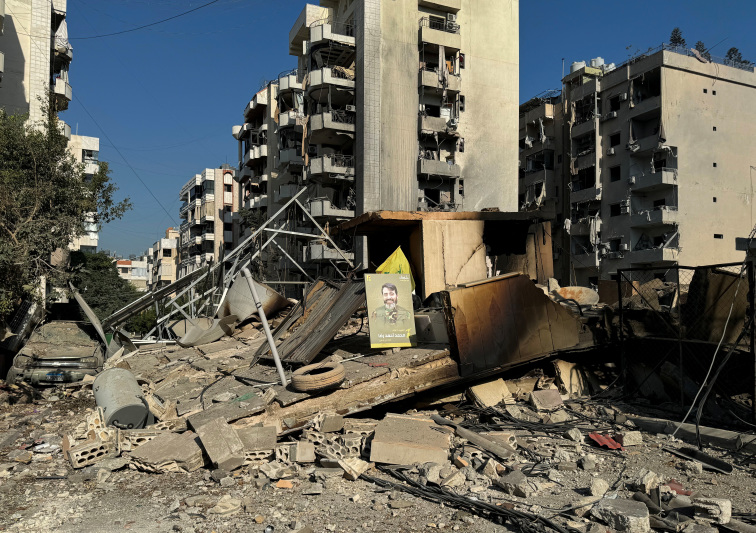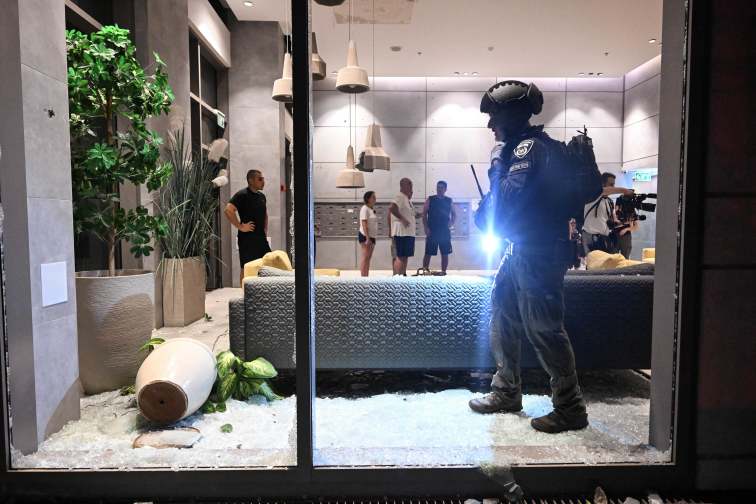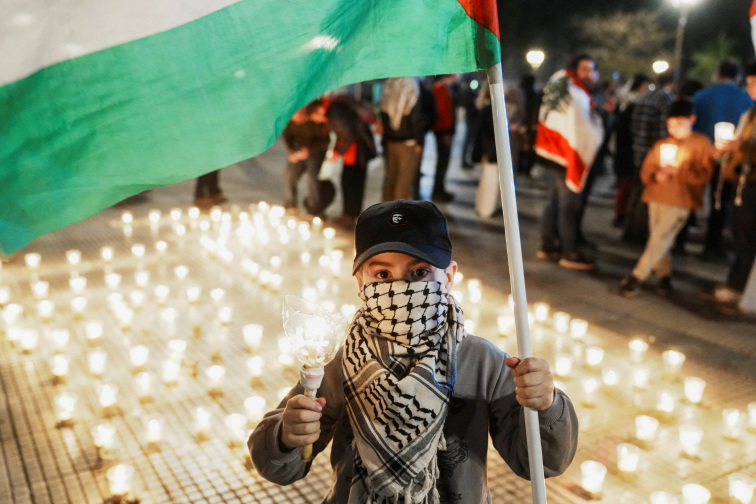A view shows a damaged site in the aftermath of Israeli strikes on Beirut's southern suburbs, amid the ongoing hostilities between Hezbollah and Israeli forces, Lebanon October 8, 2024. (REUTERS/Ahmad Al-Kerdi)
JERUSALEM/BEIRUT (Reuters) - Prime Minister Benjamin Netanyahu said on Tuesday Israeli airstrikes had killed two successors to Hezbollah's slain leader, as Israel expanded its offensive against the Iran-backed group with a fourth army division deployed into south Lebanon.
Netanyahu spoke in a video released by his office hours after the deputy leader of Hezbollah, which is reeling after a spate of killings of senior commanders in Israeli airstrikes, left the door open to a negotiated ceasefire.
"We've degraded Hezbollah's capabilities. We took out thousands of terrorists, including (Hassan) Nasrallah himself and Nasrallah's replacement, and the replacement of the replacement," Netanyahu said, without naming the latter two.
Earlier on Tuesday, Israeli Defence Minister Yoav Gallant said Hashem Safieddine, the man expected to succeed Nasrallah, had probably been "eliminated". It was not immediately clear whom Netanyahu meant by the "replacement of the replacement".
Safieddine has not been heard from publicly since another airstrike late last week, part of an escalating Israeli offensive after a year of border clashes with a major foe that has been clashing with Israel along the border in support of Palestinian militants fighting Israel in Gaza.
"Today, Hezbollah is weaker than it has been for many, many years," Netanyahu added in reference to the most formidably armed of Iran's proxy forces across the Middle East.
The heightened regional tensions kindled a year ago by Palestinian armed group Hamas' attack from Gaza on southern Israel have escalated in recent weeks to engulf Lebanon.
On Oct. 1, Iran, sponsor of both Hezbollah and Hamas, fired missiles at Israel. On Tuesday, Iran warned Israel not to follow through on threats of retaliation. Its foreign minister said any attack on Iran's infrastructure would be avenged.
Western powers are seeking a diplomatic solution, fearing the conflict could roil the wider, oil-producing Middle East.
FOURTH ISRAELI ARMY DIVISION IN LEBANON
The Israeli military said it had sent the 146th Division into south Lebanon, the first reserve division to have been deployed over the border, and was extending ground operations against Hezbollah from southeast Lebanon into its southwest.
A military statement did not specify how many soldiers were now inside Lebanon. But the military had previously announced that three other army divisions were operating there, meaning that thousands of soldiers were likely on Lebanese soil.
The Israeli military announced on Oct. 1 that ground forces had entered Lebanon, initially with commando units that were then followed by regular armoured units and infantry units.
A military spokesperson declined to say how many troops were in Lebanon at one time. "It is a dynamic type of operation, limited, targeted raids and raids means in and out, means movement, means different locations, means different forces and so on," Lieutenant Colonel Nadav Shoshani told a media briefing.
Overnight, Israel again bombed Beirut's southern suburbs where Hezbollah is headquartered and said it had killed a figure responsible for the heavily armed Iranian proxy militia's budgeting and logistics, Suhail Hussein Husseini - the latest in a string of assassinations of some of Hezbollah's top officials.
In northern Israel not far from the Lebanon border, warning sirens sounded regularly throughout Tuesday as authorities said Hezbollah fired almost 200 rockets into Israel.
Targets again included Haifa, the northern port city where there were multiple reports of damage to buildings from missile debris. Israel's military said it had struck the launchers that fired the missiles at Haifa.
The mushrooming Israeli-Hezbollah conflict has killed well over 1,000 people in Lebanon in the past two weeks and prompted the mass flight of more than a million.
Israel's stated objective is to make its northern areas safe from Hezbollah rocket fire and allow thousands of displaced residents to return.
NASRALLAH SUCCESSOR LIKELY 'ELIMINATED'
Safieddine, the senior Hezbollah official, was widely expected to succeed Hassan Nasrallah, the Shi'ite Muslim movement's longtime leader assassinated in an Israeli airstrike on south Beirut on Sept. 27.
"Hezbollah is an organisation without a head. Nasrallah was eliminated, his replacement was probably also eliminated," Gallant told officers at the Israeli military's northern command centre, in a brief video segment distributed by the military.
Safieddine has been a prime target for Israel, nurtured as an influential leader and potential heir to Nasrallah. As head of Hezbollah's executive council, he has overseen the group's political affairs, while also sitting on the Jihad Council that manages its military operations.
In a televised speech from an undisclosed location shown before the release of Gallant's video, Hezbollah's deputy leader Naim Qassem said he backed attempts to secure a truce.
For the first time, the end of war in Gaza was not mentioned as a pre-condition to halting the combat in Lebanon. Qassem said Hezbollah backed moves by Speaker of Parliament Nabih Berri, a Hezbollah ally, to secure a halt to the fighting.
Netanyahu's office declined to comment on Qassem's remarks.
Qassem said Hezbollah's capabilities were intact despite "painful blows" from Israel. "Dozens of cities are within range of the resistance's missiles. We assure you that our capabilities are fine."
(Reporting by Elwely Elewelly in Dubai and Maya Gebeily in Beirut and Benoit Van Overstraeten in Brussels and Emma Farge in Geneva; writing by Michael Georgy and Mark Heinrich; editing by Peter Graff, Timothy Heritage and Ros Russell)











News magazine bootstrap themes!
I like this themes, fast loading and look profesional
Thank you Carlos!
You're welcome!
Please support me with give positive rating!
Yes Sure!